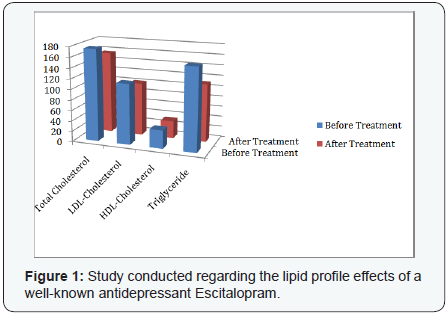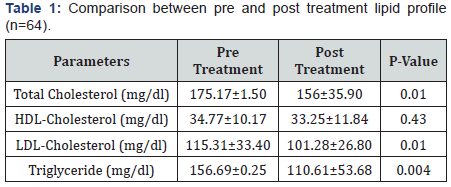Reduction of Serum Lipid Profile by Escitalopram in Depressive Patients: A Cardio Protective Aspect of SSRI Use-Juniper Publishers
JUNIPER PUBLISHERS-OPEN ACCESS JOURNAL OF CARDIOLOGY & CARDIOVASCULAR THERAPY
Abstract
Background: Depression is
disturbance of mood, speech and thoughts interfering with the
individual’s social life and negatively affecting the family and thus
the whole society. Suicide is the most horrible complication ending the
life of the patient. Escitalopram belongs to the SSRIs, the most
commonly used group of antidepressants worldwide.
Objective: To explore the effects of Escitalopram treatment on lipid profile in patients with depression.
Methodology: This experimental
study of 6 months duration was conducted in Sir C.J Institute of
Psychiatry Hyderabad and Isra Research Laboratory from July 2016 to
December 2016. 72 diagnosed patients of depression were selected through
non probability purposive sampling. After ethical approval and informed
consent blood sample were collected under a septic measures. Samples
were analyzed for total cholesterol, HDL, LDL and TAGs before
intervention. 8 patients were dropped out from study as they lost follow
up after 1 month. Same test were repeated in 64 patients who completed
the study while after 6 weeks. Student’s t-test was used as statistical
technique data was analyzed on SPSS version 21.
Results: There was significant
reduction in total cholesterol, LDL and TGs when compared with the
pretreatment values P-values 0.01, 0.01 and 0.004 respectively. But
there was no significant difference in HDL levels before and after
treatment P-value 0.43.
Conclusion: Treatment with Escitalopram is associated with significant reduction in lipid profile.
Introduction
Depression is a very common and ancient mental
disorder prevalent all over the world since centuries affecting all age
groups of both male and female genders. It is the 4th most serious
public health problem worldwide with about 350 million people being
affected and expected to be the most common mental disorder by year 2020
[1]. Depression has a wide range of symptoms that include low mood,
negative thoughts, pessimism, guilt, and ugliness, indecisiveness, lack
of interest and motivation, decreased sexual desire, appetite and sleep
[2]. Depressive patients end their lives through suicide as a
Complication of the disease. Suicide rates vary from country to country
with Hungary on top where the rate is 58/100, 000 followed by, USA
20/100000 and Spain9/100000 every year. Prevalence of depression has
long been studied in different populations that were found as ranging
from 5% in general population and 10%-20% in chronic sick patients [3].
It is 3%-
8.7% prevalent in children and 25% in pregnant women [4].
Students show a prevalence of 53.43% in Pakistan while 26.2% in Turkey
[5]. Depression is also a risk factor for atherosclerosis in addition to
smoking, physical inactivity, obesity and dyslipidemia [6]. The ideal
treatment plan for depression consists of pharmacotherapy, psychological
and educational interventions [7]. There are many pharmacological
treatment options for depression like Tricyclic antidepressants (TCAs),
mono amine oxidase inhibitors (MAOIs), Selective serotonin
norepinephrine inhibitors (SNRIs), selective serotonin reuptake
inhibitors (SSRIs) and atypical antidepressants [8]. SSRIs are most
popular as they are safe, more tolerable, cheaper and due to their
spectrum of indication other than depression [9]. It is also used to
treat the premature ejaculation [10]. Escitalopram is derived from
Citalopram with a bioavailability of 80% and half- life of 27-32 hours
makes it once daily dosage of 10-20mg/day [9]. It is recommended to
check total cholesterol, LDL-C, HDL-C and triglycerides in patients
which are at risk of atherosclerosis[11]. Few previous researches
pointed out depression to be
associated with disturbed lipid profile and such patients are
more violent and prone to suicide [12]. Vaan Reed Dortland et
al. [13] from Netherland also reported abnormal lipid pattern
in depression. High levels of total cholesterol, LDL-cholesterol
as well triglycerides were observed by Liang Y et al. [14] in
depressive patients. As the duration of therapy is longer in
depressive patients there is need of studies to observe effects of
escitalopram on lipid profile that are not studied well in human
so far. This additional information may help the depressed
patients with comorbid conditions like ischemic heart diseases
and dyslipidemia.
Depressive patients were selected from Sir Cowasjee
Institute of Psychiatry Hyderabad Sindh, Pakistan after informed
written consent. The study project was approved from the
ethical review committee of the Isra University. Fasting blood
samples were taken from the antecubital vein under aseptic
measures. Samples were brought to Isra university hospital
laboratory for biochemical analysis. Lipid studies were done on
Hitachi automatic analyzer after obtaining serum through the
centrifugation of whole blood at 3000 round per minutes.
Data analysis was accomplished using SPSS (Statistical
Package for Social Sciences) version 21. Mean and standard
deviation were calculated for the numerical variables. Paired
sample t-test was used to compare the means of the pre and post
treatment value of TC, LDL, HDL and TGs.


Serotonin reuptake inhibitors have been used for very long
period and they are associated with excellent results regarding
reduction in the depressive symptoms in depressive patients.
They are drugs of interest. Depression is a very disturbing
mental health disorder of the world in all age groups of both
male and female sex disturbing lives and ending into suicide
of 1million people every year [15]. Our community has a poor
knowledge about depression including the health care providers
[16]. Escitalopram is the first line choice SSRI, superior in
efficacy and well tolerated by the patient 90. Its metabolic
effects are of great interest as the drug is commonly used for
longer periods. Our study is the first human study conducted
in Pakistan regarding the lipid profile and glucose effects of a
well-known antidepressant Escitalopram. However there are
few studies available on the same parameters but they were
limited and controversial due to comorbidities. Our study was
purely based on depressive patients provided by the consultants
Psychiatrists of the Sir Cowasjee Jahangir Institute of Psychiatry
Hyderabad Sindh, Pakistan.
Our 6 weeks study showed a reduction in serum total
cholesterol that was in contrast to findings of Jana Radojkovic
et al. [17] reporting no significant reduction in total cholesterol.
This may be due to the fact that the study population was
diabetic in his work. However our findings were consistent with
AminaUnis et al. [18]. Who declared a significant decrease in
total cholesterol after 6 weeks treatment with Escitalopram in
an animal model. M Beyazyaz et al. [19] in his relatively longer
duration study (16 weeks) also reported a reduction in serum
total cholesterol following Escitalopram treatment that is in
accordance with our results.
Our study reported a non-significant reduction in HDL levels
which is in contrast to results of study by Amin Unis et al. [18]
which shows a significant increase in HDL levels. Our results are
in accordance with the results of M Beyazyaz et al. [19] who also
reported no significant effects of Escitalopram on serum HDL
concentration. As we know the HDL cholesterol is beneficial
cholesterol so it should not be reduced but should be increased
studies proved so far that Escitalopram either increases the HDL
levels or if reduces but not to significant levels.
Low density cholesterol was reduced in our study which is in
accordance with the study by Amina Unis et al. [18] which also
showed a significant reduction in LDL cholesterol. Similarly our
results are also consistent with the findings of M Beyazyaz et al.
[19] who also reported a significant in LDL cholesterol.
There is highly significant reduction in triglyceride levels
in our study which in accordance with the results of JanaRadojkovic et al. [17] who also concluded a significant decrease
in triglyceride levels. Our results are also consistent with the
results of Amina Unis et al. [18] which showed a significant
reduction in serum triglyceride level after treatment with
Escitalopram. Results of the study by M Beyazyaz et al. [19]
showed an increase in the triglyeride levels which is in contrast
to our findings. All studies discussed so far lack a common
feature that none of them explained the possible mechanism
of reducing the lipid profile. This remained a weakness of our
study as well and a gape for the future researchers to work on.
Escitalopram may have some inhibitory effect on lipolipase an
enzyme responsible for breakdown of fats into fatty acids and
triglycerides. It may also possess some activity at LDL receptors
increasing its uptake all needs further exploration.
Parameters of lipid profile (TC, LDL, TGs) are significantly
reduced in depressive patients on Escitalopram treatment
however HDL-cholesterol remained unchanged (nonsignificant).
- The use of Escitalopram is recommended for depressive patients with dyslipedimia as well as cardiac patients.
- It is recommended to explore the exact mechanism behind the lipid lowering effects of Escitalopram.
For more articles in Open Access Journal of
Cardiology & Cardiovascular Therapy please click on: https://juniperpublishers.com/jocct/index.php



Comments
Post a Comment